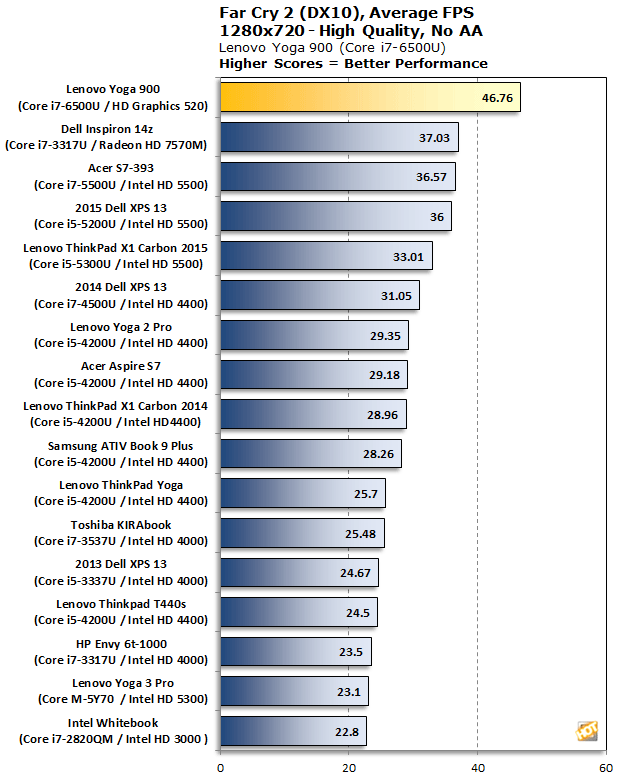Cinebench R11.5 is a 3D rendering performance test based on Cinema 4D from Maxon. Cinema 4D is a 3D rendering and animation suite used by animation houses and producers like Sony Animation and many others. It's very demanding of processor resources and is an excellent gauge of pure computational throughput.
 |
|
Cinebench R11.5
|
|
3D Rendering On The CPU And GPU | |
This is a multi-threaded, multi-processor aware benchmark that renders a photorealistic 3D scene (from the viral "No Keyframes" animation by AixSponza). This scene makes use of various algorithms to stress all available processor cores. The rate at which each test system was able to render the entire scene is represented in the graph below.
Here we see the 2.5GHz to 3GHz Turbo-boosted Skylake Core i7-6500U stretch its legs nicely. The Yoga 900 and Skylake put up nearly a 17% performance gain in the CPU test over the fastest ultrabook score we've recorded to date. In the OpenGL graphics test, Skylake-U reports roughly an 11 percent advantage.
Next up, we have 3D graphics testing with 3DMark Cloud Gate. The Cloud Gate test is aimed at entry-level PCs and laptops, and has two subtests: a processor-intensive physics test and two graphics tests. We run the test suite at its default 1280 x 720 resolution and at default rendering quality settings. Keep in mind that 3DMark Cloud Gate scores aren’t comparable to scores from say, 3DMark Fire Strike (gaming PCs) or Ice Storm (smartphones and tablets).
 |
|
3DMark Cloud Gate{Title}
|
|
Synthetic DirectX Gaming And Graphics Testing | |

In FireStrike, which is a lighter-duty DX11 graphics test, we see another 10% advantage for the Skylake-U Core i7-6500U chip in the Lenovo Yoga 900, once again pulling down the fastest score we've recorded in this class of machines to date.
 |
|
Far Cry 2 Benchmark
|
|
DX10 Gaming Performance
|
|
 When
it comes to lush vegetation in a steaming, sinister jungle, no one
pulls it off quite like Ubisoft does in its Far Cry series. Far Cry 2
uses high-quality textures, complex shaders, and dynamic lighting to
create a realistic environment. The game’s built-in benchmark gives us a
good look at a system’s graphics performance with DirectX 10. Though
it's not a demanding test by today's standards for heavy duty graphics
cards or gaming PCs, it does make for a good barometer of raw graphics
horsepower in ultralight notebook architectures, which typically don't
cater to hardcore gaming workloads.
When
it comes to lush vegetation in a steaming, sinister jungle, no one
pulls it off quite like Ubisoft does in its Far Cry series. Far Cry 2
uses high-quality textures, complex shaders, and dynamic lighting to
create a realistic environment. The game’s built-in benchmark gives us a
good look at a system’s graphics performance with DirectX 10. Though
it's not a demanding test by today's standards for heavy duty graphics
cards or gaming PCs, it does make for a good barometer of raw graphics
horsepower in ultralight notebook architectures, which typically don't
cater to hardcore gaming workloads. 
Here in an actual game engine with Far Cry, we see a much more sizable lead for Skylake-U. This equates to over a 20% gain in performance from Intel's HD Graphics 5500 engine in the previous generation Broadwell architecture to the new HD Graphics 520 engine in Skylake-U. And it even was able to surpass a legacy low-end discrete solution from AMD in this game benchmark. Integrated Intel HD Graphics have come a long way.


 When
it comes to lush vegetation in a steaming, sinister jungle, no one
pulls it off quite like Ubisoft does in its Far Cry series. Far Cry 2
uses high-quality textures, complex shaders, and dynamic lighting to
create a realistic environment. The game’s built-in benchmark gives us a
good look at a system’s graphics performance with DirectX 10. Though
it's not a demanding test by today's standards for heavy duty graphics
cards or gaming PCs, it does make for a good barometer of raw graphics
horsepower in ultralight notebook architectures, which typically don't
cater to hardcore gaming workloads.
When
it comes to lush vegetation in a steaming, sinister jungle, no one
pulls it off quite like Ubisoft does in its Far Cry series. Far Cry 2
uses high-quality textures, complex shaders, and dynamic lighting to
create a realistic environment. The game’s built-in benchmark gives us a
good look at a system’s graphics performance with DirectX 10. Though
it's not a demanding test by today's standards for heavy duty graphics
cards or gaming PCs, it does make for a good barometer of raw graphics
horsepower in ultralight notebook architectures, which typically don't
cater to hardcore gaming workloads. 







